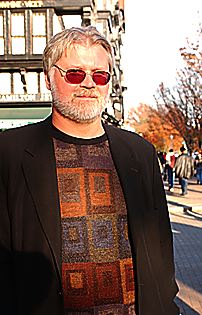Urban sociologist makes plans to reach outBy Jennifer Greenstein Altmann Princeton NJ -- When Douglas Massey, an expert in urban planning, sits down to tackle a problem, he likes to keep in mind some of the blunders that urban planners have made in the past.
One of the classic examples is the high-rise public housing developments of the 1950s and 1960s, said Massey, who joined the Princeton faculty last fall. Entire inner-city neighborhoods were demolished to make way for the high rises, but they turned out to be more conducive to crime and drug dealing than the previous buildings. A mother on the 30th floor couldn't supervise her children hanging out in front of the building, for example. Elevators constantly broke down. And too many people with social problems were concentrated in a small area. "The plans were based on people's suppositions about what was needed in these neighborhoods, but nobody got out and studied. They were just imposing what they thought, and it was all wrong," said Massey, professor of sociology and public policy at the Woodrow Wilson School, citing class bias as a source of the planners' misjudgments. "As a social scientist, one of the things you learn is how hard it is to figure out what the right answer is. Just because you have good intentions and you want to solve the problems of the world, you can often do more harm than good." Remembering those mistakes keeps him humble, for one thing, and keeps him focused on the key to doing the job right: gathering and consulting the proper data. Massey deftly assembled and analyzed that kind of data for his book, "American Apartheid: Segregation and the Making of the Under- class" (Harvard University Press, 1993), which deals with housing segregation in the United States. The book documents the degree to which African Americans are segregated in American society, more than any other group in the country's history. It also explores how the ghetto became the central feature of American cities and the consequences of that for African Americans. "It was written in the context of the debate on the so-called urban underclass, in which people were saying the problem was welfare, and no one was talking about the fact that the United States was a segregated society," he said.
Massey has done pioneering work in his fields of research, which include urban sociology, international migration, Latin America, and race and its place in American society. "He is the leading urban sociologist in the U.S.," said Anne-Marie Slaughter, dean of the Woodrow Wilson School. Massey's arrival at Princeton comes 25 years after he received his Ph.D. in sociology from the University. Previously he taught at the University of Pennsylvania, where he was the Dorothy Swaine Thomas Professor of Sociology and chair of the department, and at the University of Chicago. He is happy to be back and looks forward to interacting with his new colleagues. "I have a lot of friends on the faculty," he said. "And it's a real benefit to be in a position to hear about their work as it unfolds." Massey also takes over as director of the Wilson School's urban and regional planning graduate program, which he intends to restructure next year, realigning it to focus more broadly on urban policy. He plans to integrate the program more closely with studies of the New Jersey area by establishing an ongoing compilation of data about the New York to Philadelphia corridor. "I'd like to use that as a platform for research and for answering questions about important policy issues that affect the whole country but are really going to play out in obvious ways in this region," he said. This year, while on leave, Massey is working on three books, among them a volume about the progress of minorities in higher education. It is the second installment in a series inaugurated last year with "Source of the River: The Social Origin of Freshmen at America's Selective Colleges and Universities," published by Princeton University Press, which he edited. Massey also is working on a history of urban society and a book that outlines a liberal political agenda for the United States. "I want to reach a wider audience, and that's partly where the Wilson School comes in," he said. "It's my turn to take the gifts I've been given in academia and turn them to a broader public good -- as Woodrow Wilson said, 'Princeton in the nation's service.'" This story is the third in a series of articles profiling some of the new professors on Princeton's faculty this year. |
Contents |
|||||||||||

